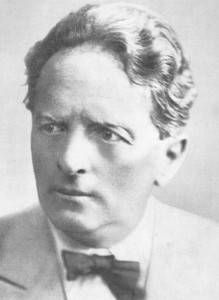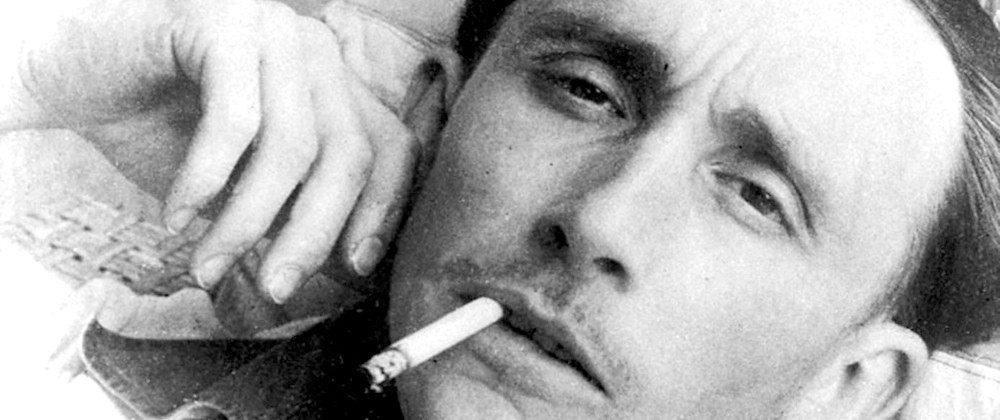Son numerosos los congresos y sesiones académicas dedicados este año a la reflexión filosófica sobre el cine. No se trata de la acostumbrada lectura filosófica de contenidos cinematográficos, de las películas, sino de una clara vuelta a aquel pensamiento filosófico sobre lo cinematográfico y lo fílmico que fundó, con Münsterberg o Balázs, la teoría del cine.
André Bazin pensó el cine antes de la era audiovisual.
En los años noventa, el congitivismo de David Bordwell y Noël Carroll recuperó la lectura filosófica del medio cinematográfico superando la hegemonía ejercida por la semiótica en los estudios fílmicos desde los años setenta. No obstante, las conocidas historias de la teoría del cine publicadas por Francesco Casetti y Robert Stam a mediados de los noventa parecieron ‘clausurar’ con su relato la historia del pensamiento cinematográfico. Más recientemente, la consolidación de la llamada Film-Philosophy en el ámbito anglosajón y la continuidad de los estudios cognitivos han hecho que la reflexión sobre el cine ocupe un lugar importante en las discusiones de estética y filosofía académicas. Queda pendiente la recuperación de aquella gran tradición fenomenológica fomentada en Francia durante los años cincuenta —en el contexto situado entre Bazin y Morin— a la que se llamó Filmología.
 Es cierto que los estudios sobre la imagen abarcan gran parte de los aspectos de la cultura audiovisiva en la era audiovisual, pero ignoran con frecuencia que el cine es más antiguo que la imagen, que la era cinematográfica —en la que el contexto era otro— es anterior a la era audiovisual. Con frecuencia se olvida que la imagen audiovisual de nuestro tiempo procede en gran parte de la desacralización de la imagen cinematográfica clásica.
Es cierto que los estudios sobre la imagen abarcan gran parte de los aspectos de la cultura audiovisiva en la era audiovisual, pero ignoran con frecuencia que el cine es más antiguo que la imagen, que la era cinematográfica —en la que el contexto era otro— es anterior a la era audiovisual. Con frecuencia se olvida que la imagen audiovisual de nuestro tiempo procede en gran parte de la desacralización de la imagen cinematográfica clásica.
Los numerosos eventos que proponen repensar el cine en los próximos meses parecen haber superado, al menos en parte, esa falta de los estudios de la imagen recientes.
Béla Balázs fue de los primeros en entender que la materia prima del cine no era la realidad fotografiada sino la mente del espectador.
Society for Cognitive Studies of the Moving Image/
June 17 – 20, 2015, London
SCSMI’s 2015 annual conference will be held at Birkbeck, University of London, UK, from Wednesday afternoon, June 17th through Saturday, June 20th, 2015. Birkbeck is located in Bloomsbury, central London, a quick walk from major tourist sights and travel connections.
The conference programme will contain a mixture of invited keynote presentations, and special events as well as long (50 mins) and short (23 mins) paper presentations and posters selected from submissions.
Following a record number of submissions we are pleased to confirm the schedule which contains 88 talks and 10 poster presentations over the four days.
http://scsmi-online.org/conference
Listening Cinematically/
http://goldenpages.jpehs.co.uk/2014/09/24/listening-cinematically/
Film-Philosophy Conference 2015: The Evaluation of Form/
University of Oxford
July 20, 2015 – July 22, 2015
Keynote Speakers: Noël Carroll, Alex Clayton, Tarja Laine.
The eighth Film-Philosophy Conference 2015 takes as its major focus the evaluation of film form and style. The conference this year will encourage the discussion of criteria and reasons for valuing aspects of form and the moment-by-moment processes of evaluation as they relate to the form and style of a whole film, a sequence from a film, or even an individual moment.
http://www.film-philosophy.com/conference/index.php/conf/FP2015
Moving Pictures: Emotion, Art and Value: Western Canadian Philosophical Association/
52nd Annual Meeting
Hosted by the Department of Philosophy, University of Saskatchewan
October 2-4, 2015
Keynote Speaker: Eva Dadlez. University of Central Oklahoma
Dr. Dadlez writes on issues at the intersection of aesthetics, ethics and epistemology and is author of What’s Hecuba to Him? Fictional Events and Actual Emotions (1997) and Mirrors to One Another: Emotion and Value in Jane Austen and David Hume (2009).
Call for Papers
Submissions on the conference theme of Moving Images: Art, Emotion, and Value are especially encouraged, though papers on any topic in philosophy are welcome.
Electronic submissions only, in .rtf, .doc, or .pdf anonymized for refereeing. Maximum 3,500 words (presentable in 25-30 minutes). Please include a short abstract (less than 75 words) as well as your name, email address, and academic affiliation (if applicable).
Email submissions to wcpa.2015@usask.ca by July 1, 2015.
To be eligible for the student prize, mention student status.
If you are interested in commenting on a paper, please contact wcpa.2015@usask.ca
http://www.usask.ca/philosophy/WCPA/
Moving Images 2015: Perception – Reception – Interaction. Varieties and Characteristics of Media Image Processing/
Conference of Moving Image Sciences in Kiel, Germany, 19th and 20th November 2015.
For human perception, processing and cognition of moving images (whether they are interactive or not) the systems of the mental and the physical are crucial. Only in the interactive context of bodily participation, sensual addressing and cognitive organization emerges the phenomenal and semiotic dimension of understanding and experience; that shapes the actions of processing and cognition of media stimuli. The conference focusses on the diverse and complex interactions between the images and their specific media, the actions of perception and processing, which can be captured and analysed in connection with somatic and mental processes. In this context questions are raised about phenomenological and/or semiotic analysis of the processes of perception and reception of multimodal artefacts, about the diagrammatical and temporal structure of moving images (like movies or games), or about the role of sensomotoric processing of interactive images, which seems to be a crucial part of the reception of interactive images. The focussed types of media are kept open: all media types, like stereoscopic movies or games, technologies of virtual and augmented reality etc., all technologies and media of moving images are welcome.
Film-Philosophy: Prospects, Directions, and New Perspectives/
January 5 – 7, 2016, Tel Aviv University
Much has been learned from, and many interesting avenues for rethinking the interconnections between and among film studies and philosophy have been opened by, the burst of interest in “film-philosophy” over the past two decades. Calling upon philosophical and critical resources culled from both disciplines, this vibrant and still-emerging field presents an agenda for the kind of work for which we hope to provide a platform here: research that combines a careful and astute critique of objects of profound aesthetic appreciation with a rich and disciplined application of the methods of philosophical argumentation. We aim to expand this body of work by bringing together leading and emerging scholars and filmmakers to investigate together the significance of the objective phenomenon of the moving image and its subjective experience in order that we might enhance ongoing dialogues both within film studies and philosophical aesthetics individually and also between these discourses.
Send an Abstract (up to 500 words in length, including the research objectives, theoretical framework and methodology) and a brief Bio-CV (100 words maximum), by August 1st, 2015 to taufilmphilosophy@gmail.com. Each proposal must include title, name(s), affiliation, and email addresses of the author(s). Notification of acceptance/rejection of abstracts will be sent by September 1st, 2015. Travel and accommodation costs will be covered by participants.
Submission deadline: August 1, 2015
http://www.aesthetics-online.org/events/index.php?events_id=776
Transcendence and Film/
Scheduled in conjunction with the 2016 meetings of the
American Philosophical Association
Eastern Division (Washington, DC): January 6-9, 2016
Pacific Division (San Francisco, CA): March 30 – April 3, 2016
These panel sessions will be devoted to a discussion of the ways in which the existentialist and phenomenological theme of «transcendence» permeates film. We are especially interested in the ways that film illustrates the limits of human understanding and the interruption of human consciousness and life. This will include the analysis of film shots and film scenes that are not governed solely by the logic of the dialogue and narrative but also by cinematic elements (music, cinematography, montage, acting performance, etc.) that help to create moments of psychological, existential, and/or spiritual illumination for film characters as well as for the audience. Papers may thereby explore the intersections between psychology and philosophy. Papers that concentrate on the work of one or more film directors with existentialist or phenomenological leanings are particularly helpful. Also, the KJSNA especially welcomes papers that incorporate relevant existentialist concepts from the philosophy of Karl Jaspers, e.g., limit situations, Existenz, encompassing, transcendence, ciphers of transcendence, and existential communication.
Presentations should be held to 20 minutes max in presentation time, however, extended versions of the presentations will be considered for publication in Existenz. .
Notification of placement will take place as follows:
September 2015 for Eastern Division (Washington, DC)
December 2015 for Pacific Division (San Francisco, CA)
http://www.bu.edu/paideia/kjsna/papercall.html









